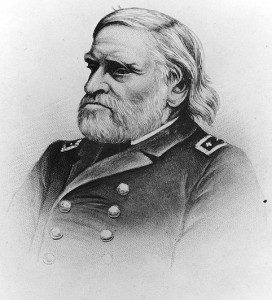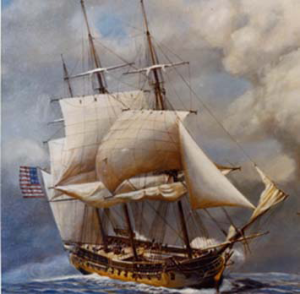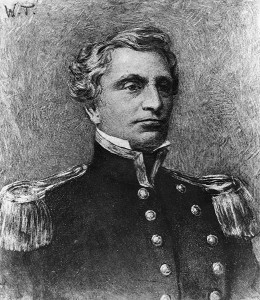On March 11, 1861 The New-York Times published a letter to the editor that dealt with the resignation of Commodore Josiah Tattnall from the US Navy and his acceptance of a commission in the Navy of Georgia. The letter responds to a public defense of Tattnall by Tattnall’s son (The New York Times Archive):
Loyaity in the Navy– The Conduct of Com. Tatnall.
To the Editor of the New-York Times:
In the Journal of Commerce of Saturday is published an article, copied from the Rochester Union, in defence of Commodore TATNALL, by his son, vindicating the course of his father in accepting a commission from the authorities of Georgia.
The least unpleasant feature of said defence is, that it is undertaken by a son, who may be excused for indulging in a very commendable anxiety that his father should appear well before the country, even though he may feel, in his own heart, that the act, to say the least of it, was unwise and unnecessary.
But the position assumed by Mr. TATNALL is entirely untenable. He says:
“If the Republic of America is a thing of the past, with its Government a corpse, as I believe, then it may be claimed that all officers at present serving under the Stars and Stripes, unless they renew their old oaths of allegiance under a different form, do so not from duty, but their own free pleasure. They are de facto free to give their swords to whatever Government they choose, and are surely not to be blamed if they accept service under that of the land which gave them birth, and has furnished them a home for life.”
Had Mr. TATNALL any knowledge, while making the defence, of the fact that Congress was in session, performing their functions as a part of the Government of these United States — enacting laws, appropriating moneys, (a portion of which was intended for the support of his father. Commodore TATNALL?) That the different Executive Departments of the Government, (now partially purged,) were in the full exercise of their appropriate duties, in directing the movements of the Army and Navy, and all other matters comprehended in the machinery of the Government? That a President and Vice-President had been elected for a term of four years, and are, at this very moment, on this very day, being inaugurated, at the seat of the Federal Government, with all the pomp and circumstance usual on such occasions? Does the gentleman see anything in all this to warrant the assertion of his belief that the “Government is a corpse,” and the Republic of America “a thing of the past!”
Although Mr. TATNALL says, “It is not for me to sound the praises of my own parent” — yet he proceeds to recapitulate the services and rewards of his father “during a career of 45 years in the American Navy;” during which his father “never once swerved from his duty to the Government, viz.: At Bladensburgh; in the Algerine war; against the Spanish pirates; in the Mexican war; and lately in the East Indies as Flag-officer, commanding the U.S. Naval forces — during which period he did good service: received a service of plate from the merchants of Baltimore; was mentioned most honorably by his superior; was wounded; received a gratifying acknowledgment in the shape of a sword presented by his native State of Georgia — and a silver vase by the citizens of Savannah,” &c., &c.
There are, probably, very few, if any, officers of the Navy who have ever, or do now, doubt the valor or abilities of Com. TATNALL; or who, up to this period, would have indulged in any suspicion of his want of patriotism and fidelity.
If Mr. TATNALL ever saw the form of the commission under which his father held his office under the Republic of the United States, he must be aware that that commission was granted by the Government in virtue of a special trust and confidence in all those qualities.
Again, if Mr. TATNALL will examine the oath taken by his father before he was allowed to perform any of the functions of his office in the Navy, he will see that he bound himself thereby to support the Constitution of the United States.
Again, if Mr. TATNALL will refer to the 10th section of the 1st article of the Constitution, he will see that Georgia, the native State of his father, has violated the Constitution, and is in a state of open rebellion against the authorities and the supreme law of the land.
And lastly, if he will now refer to the 3d section of the 3d article of the Constitution of the United States, he will see, in very plain and unmistakable language, what constitutes treason. Nor can he find anything in the Constitution granting power to any one or more States to withdraw from the Confederacy, and to be a separate Government, until legally recognized as such by the remaining States.
That several officers of the Army and Navy have followed the same course as Commander TATNALL can be in no sense a palliation — most of them are young and inexperienced, and probably acting thoughtlessly and under improper influences. Such cannot be the case with Commander TATNALL, whose age, experience and known abilities preclude any such supposition.
The very services he has performed, the trust reposed in him, and the reward allotted to him for his brilliant acts, should have, independent of his oath of allegiance, in honor deferred him from joining in the rebellion against his country.
Even in these perilous times, when every officer of the Federal Government in imperatively bound, by every sentiment of honor and fidelity, to stand ready at a moment’s call for any service to the country,Commodore TATNALL might have resigned his commission, and no one would have cared to express any opinion in the matter, as his place could have been very readily supplied; but to do so for the express purpose of joining in a rebellion, even with his native State, against the Constitution of the Republic, which he had taken an oath to support, and in which service he had enjoyed a liberal support, had conferred upon him distinguished rank and gratifying honors, is, to say the very least, most inexcusable.
It is hardly necessary to refer to the assumption of Mr. TATNALL that his father cannot be blamed for accepting office under the Government of his native State; or to the term gridiron as applied to that flag under which his father has served for 45 years, and under which he obtained all that he has of position. Whatever the sentiments of Mr. TATNALL may be in that or any other particular, that flag, the emblem of our nationality, still floats, and will continue to float — by the blessings of Almighty God — over a Republic of honest and patriotic citizens, beloved and respected at home and throughout the world as the flag of a free and enlightened country; and how many so ever may prove themselves, in this hour of peril, recreant to their trust and faithless to their obligations, there will still remain, in faithful and earnest allegiance to that glorious old flag, a band of honest men quite ready and competent to sustain it in any and every emergency.
AN OFFICER OF THE U.S. NAVY.
Tattnall’s decision reminds me of the decision Robert E. Lee had to make when Virginia seceded. Lee did not want to fight against his people from Virginia.
Josiah Tattnall did have a very long military career from the War of 1812 until he was paroled on May 9, 1865. He was captured by the North when Savannah was captured in late 1864.
The Wikipedia article says that Tatnall violated American neutrality in the Far East in the late 1850’s:
During his two years in the Far East, Commodore Tattnall violated American neutrality while commanding the chartered steamer Toey-Wan, when he came to the assistance of a British and French squadron under fire from the Taku Forts at the mouth of the Pei Ho or Hai River. His explanation of his action, “Blood is thicker than water”, subsequently became a famous slogan. On his return voyage early in 1860, carried the first diplomatic embassy from Tokugawa Japan to the United States.
The letter writer’s constitutional arguments would probably be pretty irrelevant to Tattnall.
Blood is thicker than water: Tattnall’s son defends him; Tatnall is going to help defend his home state of Georgia.




Pingback: Lady Davis Defends Charleston Harbor | Blue Gray Review